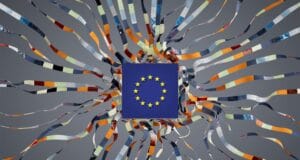This content was created by the Data Sharing Coalition, one of the founding partners of the CoE-DSC.
Please note: On April 30th 2021, the Data Sharing Coalition published the final version (1.0) of the Harmonisation Canvas, which was renamed the ‘Data Sharing Canvas’. Read the news article here.
At the Nederland Digitaal Conference on February 9th 2021, the Data Sharing Coalition announced a major milestone towards realising the potential of data sharing with the release of the “Harmonisation Canvas”, a first concrete step towards cross-sectoral data sharing at scale. Watch our session here.
Download the Data Sharing Canvas
Harmonisation Canvas: setting concrete steps to data sharing at scale
Today, at the Nederland Digitaal Conference, the Data Sharing Coalition presents the progress made since its foundation and announces a major milestone towards realising the potential of data sharing with the release of the Harmonisation Canvas. This is a first concrete step towards cross-sectoral data sharing at scale.

With a diverse set of experts, the Data Sharing Coalition explores and documents generic agreements for data sharing that, once implemented, enable data sharing at scale within and across domains and sectors. The foundation for these generic agreements is laid in the Harmonisation Canvas; a document which bundles valuable insights and knowledge gathered in a collaborative exploration of what is required to enable cross-sectoral data sharing. Today, the Data Sharing Coalition released the latest version of the Harmonisation Canvas, which already contains contributions made by 25 experts from 15 different organisations. In addition to the contributions made by experts, cross-sectoral data sharing use cases and analysis of existing data sharing initiatives provide the essential insights that are documented in the Harmonisation Canvas.
Next steps: collaborating to enable data sharing at scale across domains and sectors
The Data Sharing Coalition will continue to refine the Harmonisation Canvas and release a final version in Q2 2021. After the release of the final version, the document will be used to guide the development of generic agreements that will enable data sharing at scale within and across domains and sectors. These generic agreements on topics such as business models, data standards and security allow organisations to gain access to new sources of data. The new sources of data can then be used to create new economic value and contribute to societal themes such as smart mobility and the energy transition. A multitude of new use cases is enabled based on data shared across domains and sectors. Think of sharing energy data with mortgage providers to provide financing for energy saving measures, or sharing logistics data with insurers for improved insurance products.
Unlocking the true value of data
Data sharing across domains and sectors allows organisations to unlock the true economic and societal value of their data. In total, this new value creation can result in an additional GDP growth of up to 1% for the Netherlands and similar growth for other EU member states. The Dutch Ministry of Economic Affairs and Climate Policy recognises this, as made clear in its vision on Data Sharing and the Dutch Digitalisation Strategy, and the European Commission acknowledges this as well in their European Data Strategy; data sharing across domains and sectors is key to innovation and growth of the data economy.
Do you want to apply your expertise to contribute to the Data Sharing Canvas and enable cross-sectoral data sharing? Please send us an email: [email protected]
The most recent version of the Data Sharing Canvas can be downloaded below.




